
The Altered Scale (the only video you need) YouTube
Unlock the secrets of implying altered sounds over dominant 7th chords using the Super Locrian scale. Chops: Intermediate Theory: Advanced Lesson Overview: • Develop soloing strategies for V-I cadences. • Learn about chord extensions and alterations. • Understand how to incorporate the Super Locrian scale.
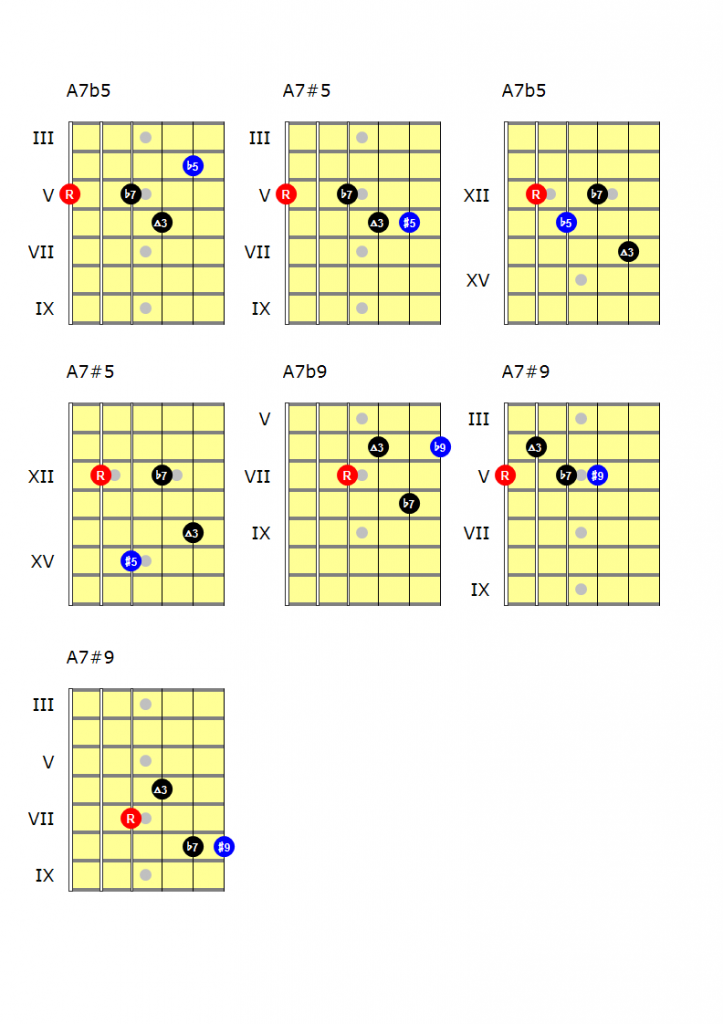
Melodic minor modes Altered Scale Andy French's Musical Explorations
The altered scale is the 7th mode of the melodic minor scale, which means that it is like playing Ab melodic minor starting from the note G. The altered scale is used to solo over dominant 7th chords, both in major and minor keys.

Altered Scale 5 patterns Discover Guitar Online, Learn to Play
Altered Scales in Music Theory: How to Play an Altered Scale Written by MasterClass Last updated: Nov 2, 2021 • 3 min read Have you ever wondered how jazz seems to push harmonic boundaries in a way that rock and pop rarely do? The secret lies in jazz's use of unconventional scales and modes, chief among them the altered scale. Learn From the Best

Key Techniques to Using The Altered Scale Over Dominant Chords • Jazz
Altered Scale. The altered scale uses the same notes as a jazz minor scale, but starts and ends on the seventh degree of that scale.. Open Position 1 Octave C Altered Scale TAB. Altered Scale Pattern. Use the movable pattern above to play this scale with any tonic note. Examples are given below.
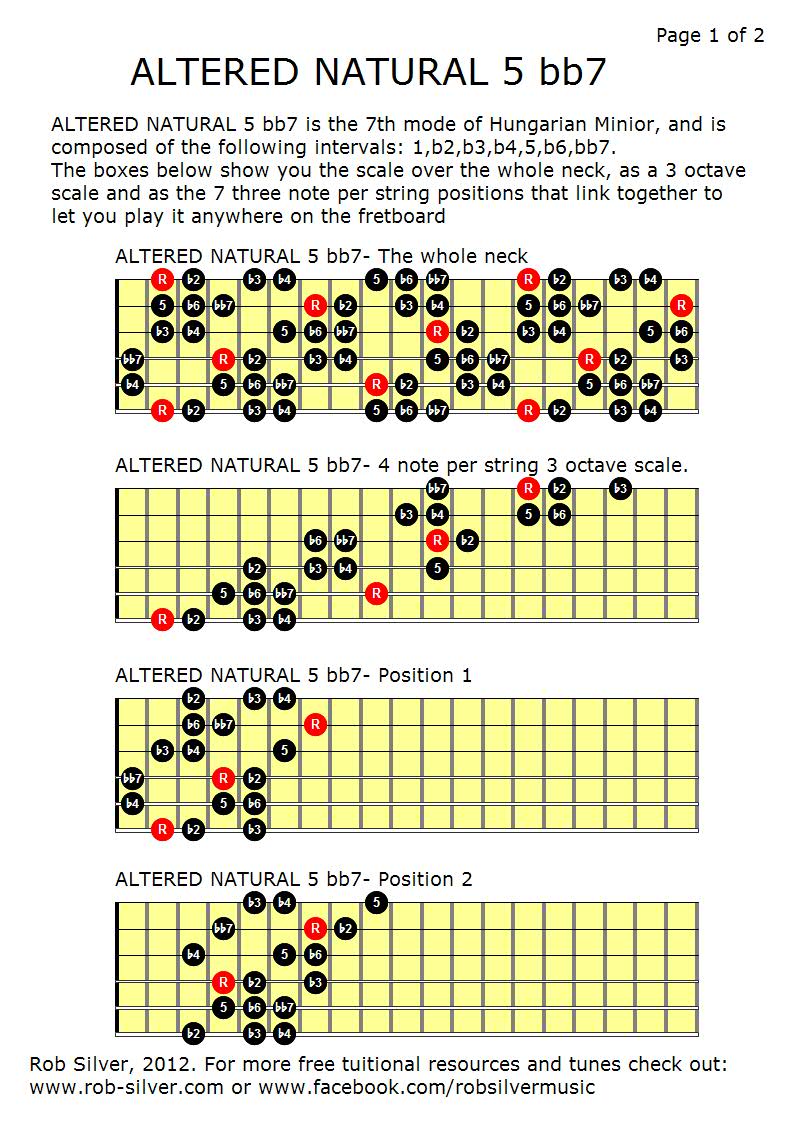
ROB SILVER ALTERED NATURAL 5 bb7
There is a scale called the "altered scale" which is a mode of the melodic minor and contains all these chord tones and will therefore work over any altered dominant chord. We will look at that last of all. The whole tone scale to deal with augmented chords of 7#5 chord types The whole-tone scale is a scale made up of whole tones only.
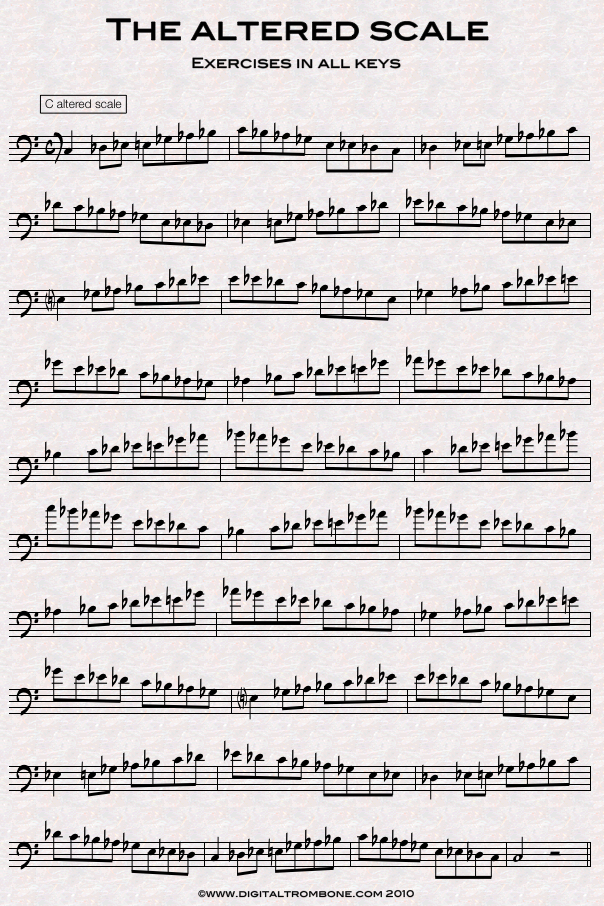
Trombone lesson Altered scale in all keys DigitalTrombone
The altered scale is made by the sequence: Half, Whole, Half, Whole, Whole, Whole, Whole The abbreviation "alt" (for "altered") used in chord symbols enhances readability by reducing the number of characters otherwise needed to define the chord and avoids the confusion of multiple equivalent complex names.

Altered Scales Explained + All 5 altered dominant scale guitar patterns
The Altered Scale, sometimes referred to as Super Locrian mode, Locrian b 4 or Diminished Whole-tone, is the seventh mode of the melodic minor scale. The formula is 1 (root) - b2 (minor second) - b3 (minor third) - b4 (diminished fourth) - b5 (diminished fifth) - b6 (minor sixth) and b7 (minor seventh).
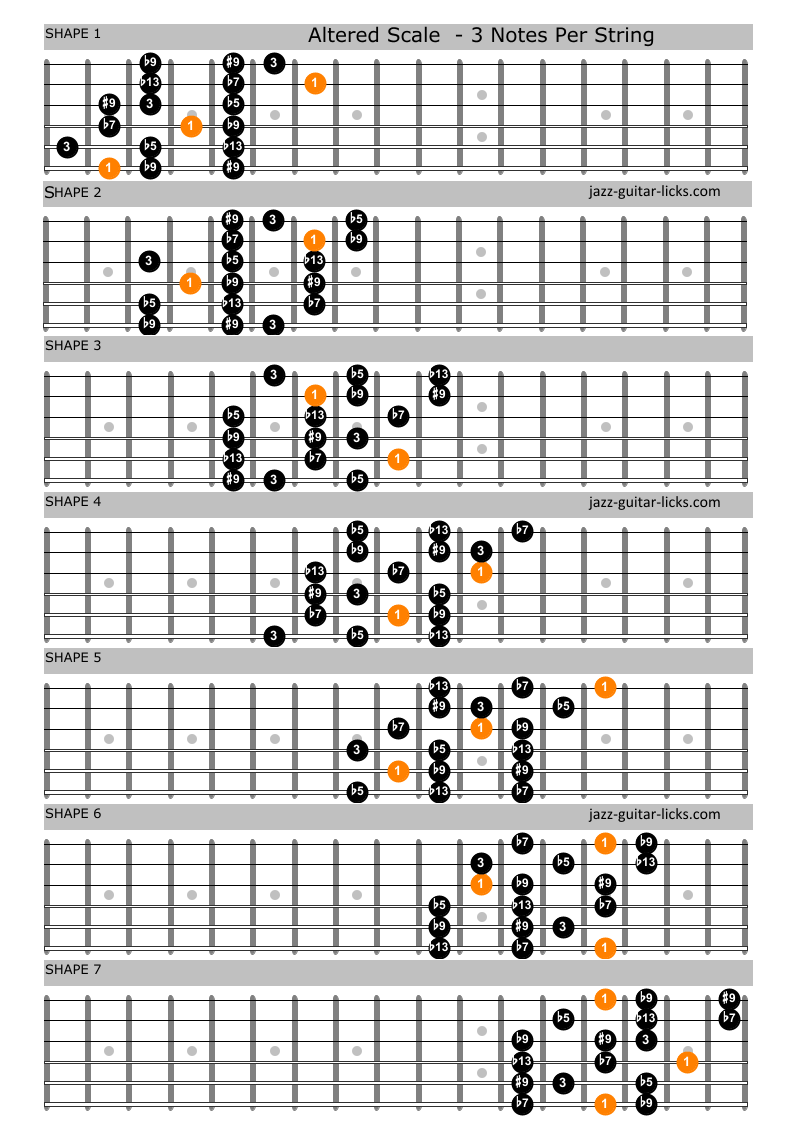
The Altered Scale For Guitar Charts, Licks, Tabs, Theory
The Altered Scale - The Complete Guide Get free weekly lessons, practice tips, and downloadable resources to your inbox! One of the most interesting improv scales you'll encounter in jazz theory is that of the Altered Scale. This vexing 7-note scale can be a bit confusing, but it is without question one of the hippest jazz scales you can play.
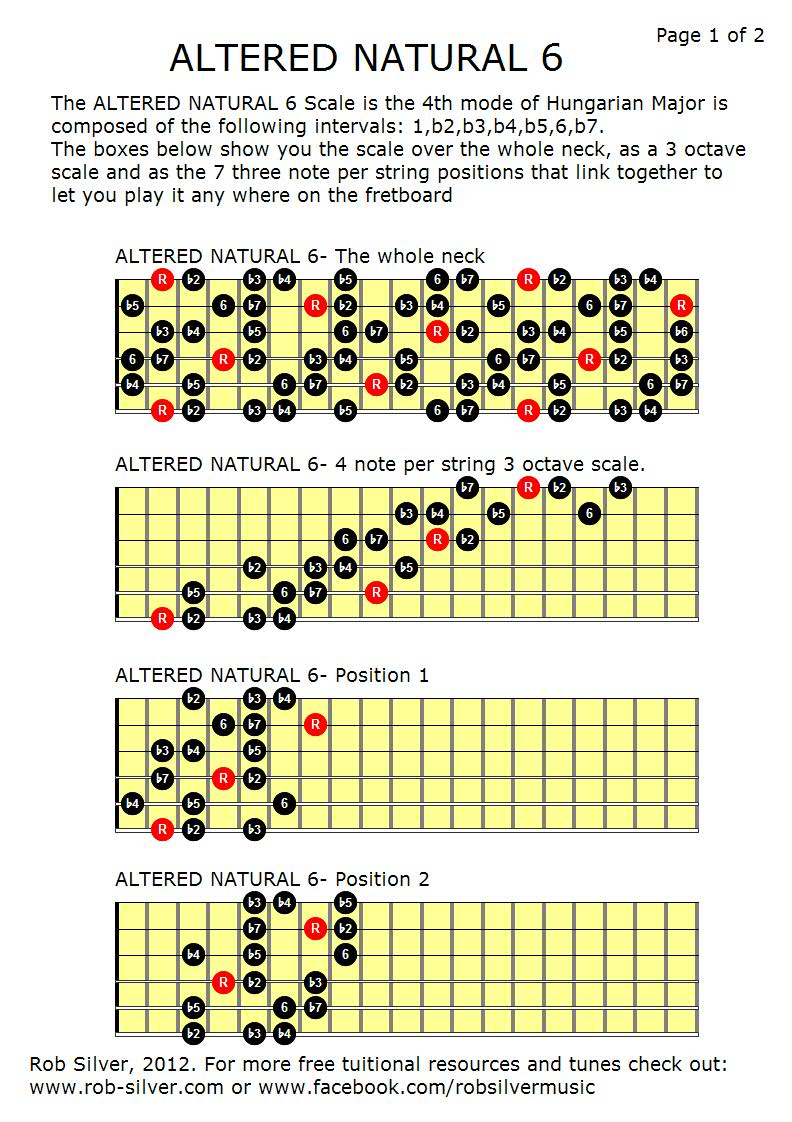
ROB SILVER ALTERED NATURAL 6 SCALE
The altered scale is a set of 7 notes based on the following scale degrees related to the root note: 1, b2, b3, 3, b5, b6, and b7. An easy way to think of the notes in an altered scale is to think of the melodic minor scale a half step above. For example, for a B altered scale, think of the C melodic minor scale starting on the 7th degree.

😎Altered Scale The Most Important Things to Know💥 https//www.youtube
Altered scales. What are they? Also called the altered dominant scale or the super locrian scale, the altered scale is a mode of melodic minor & awesome for improvising with over dominant chords. FREE PDF: Top 3 Pentatonic Scale Patterns for more melodic soloing Weekly Lesson #95 Altered Scale Lesson Content Outline with Timestamp Links:

Altered scale Top 5 Facts YouTube
The altered scale is used for playing on altered dominant chords such as E7#9, E7b9, E7#5, or E7b5, etc., because it contains all these alterations. The scale is easier to relate to chords if you write it out like this: 1, b9, #9, 3, b5, #5, b7 as you can instantly see how it might fit the above chords. You'll find it used mainly in jazz and.

Altered scale on II V I YouTube
The altered scale features 3 of the 4 chord tones of a dominant 7th chord (1, 3, and b7) plus all the extensions of the chord altered. So, the theory for the altered scale is 1, b9, 3rd, #9, #11, b13, and b7. So, whenever you see a dominant V7 chord to I written within a chord progression you can play an altered scale over the dominant chord.

274. 얼터드 스케일 연습 Altered Scale 연습 [반주,재즈를 위한 독학 피아노 연습실] YouTube
#1) Master the basic scale If you ask a group of musicians about what to play over an altered dominant chord you're likely to get a number of answers. From melodic minor scales to diminished patterns, and even tritone substitutions… But what you might not realize is that most of these altered approaches are describing the same scale.
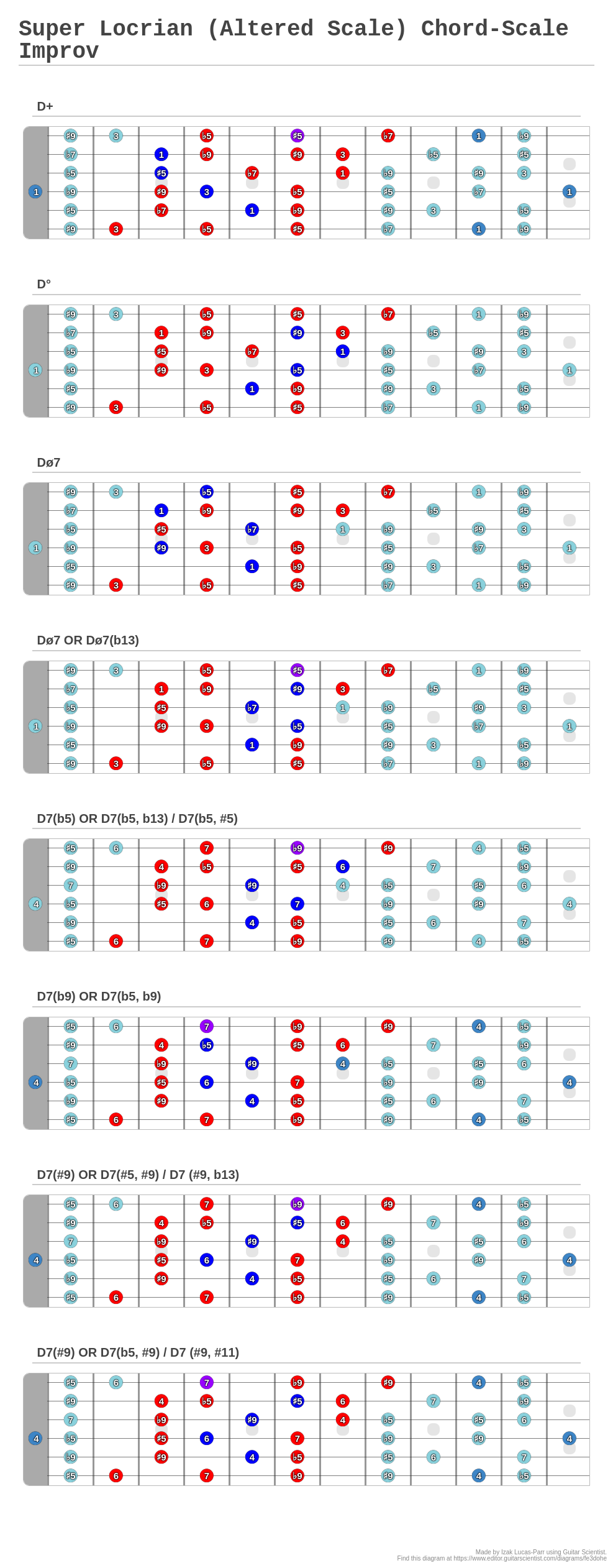
Super Locrian (Altered Scale) ChordScale Improv A fingering diagram
The Altered Scale, also known as the Super Locrian scale, allows access to the most beautiful tensions of a dominant chord in a flash. But using this scale effectively is not easy. In this lesson, we've assembled the keys to utilizing the Altered Scale to its full potential.

Altered Scale How To Make It Sound Amazing YouTube
In this lesson, I'm going to give you a few examples of how you can make some 2-5-1 lines with altered dominance, and show you some structures that you can use when you're making lines on altered dominance. The 1 st thing we need to look at is just to have some scales and put it all in a bit of tonal context. The 2-5-1's are all in the.
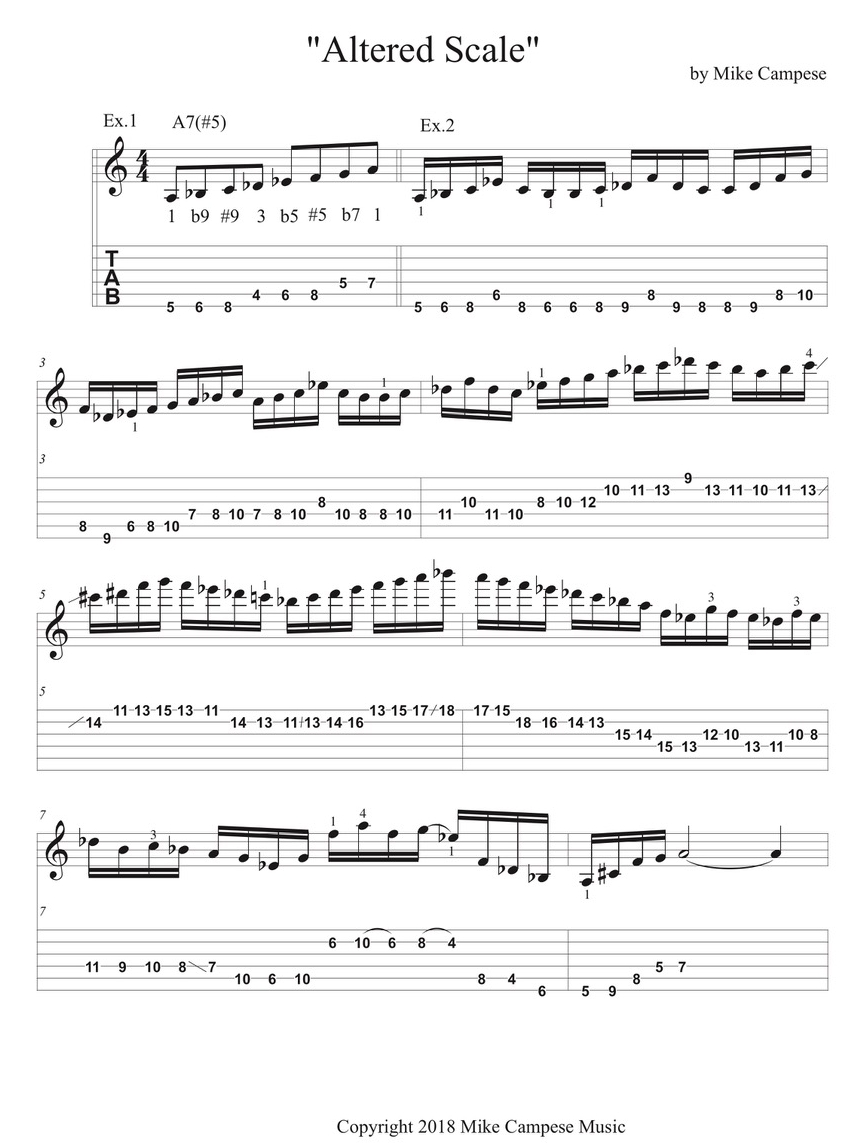
The Altered Scale Guitar Nine
Figures 4-10 provide just that, with a collection of fingering patterns for the A altered scale (A, Bb, C, C#, Eb, F, G) that make their way up the neck, starting with a pattern that climbs up to a 5th-fret A root on the high E string. (The A root notes are circled in red in all of these diagrams, in every octave where they occur.)